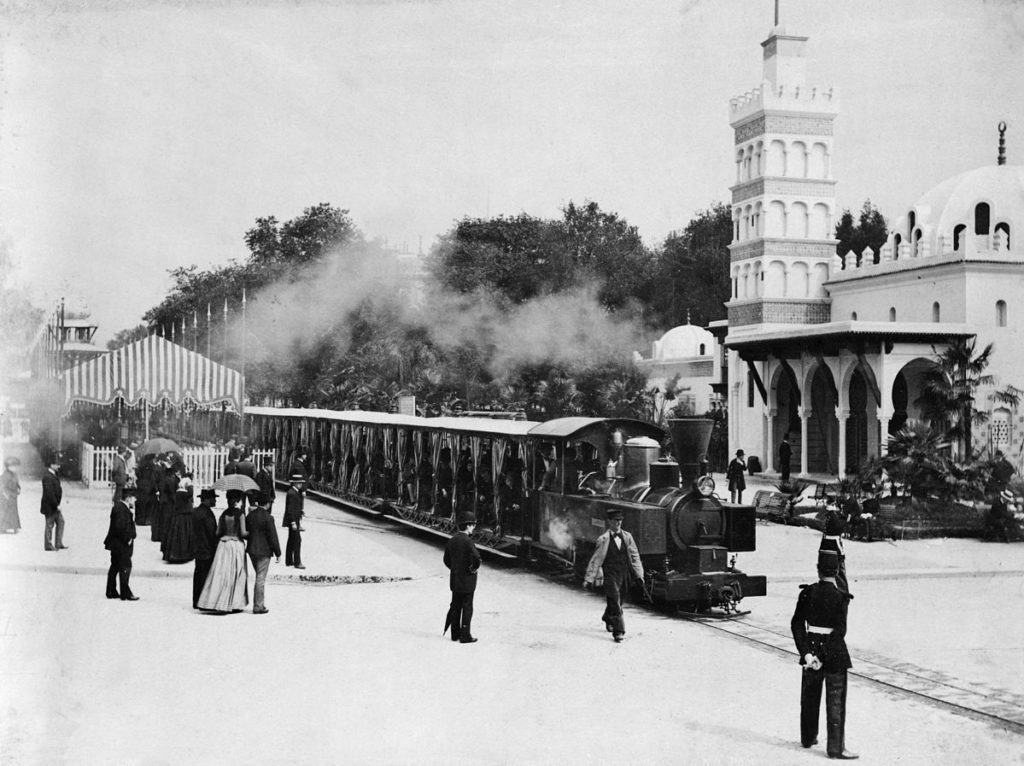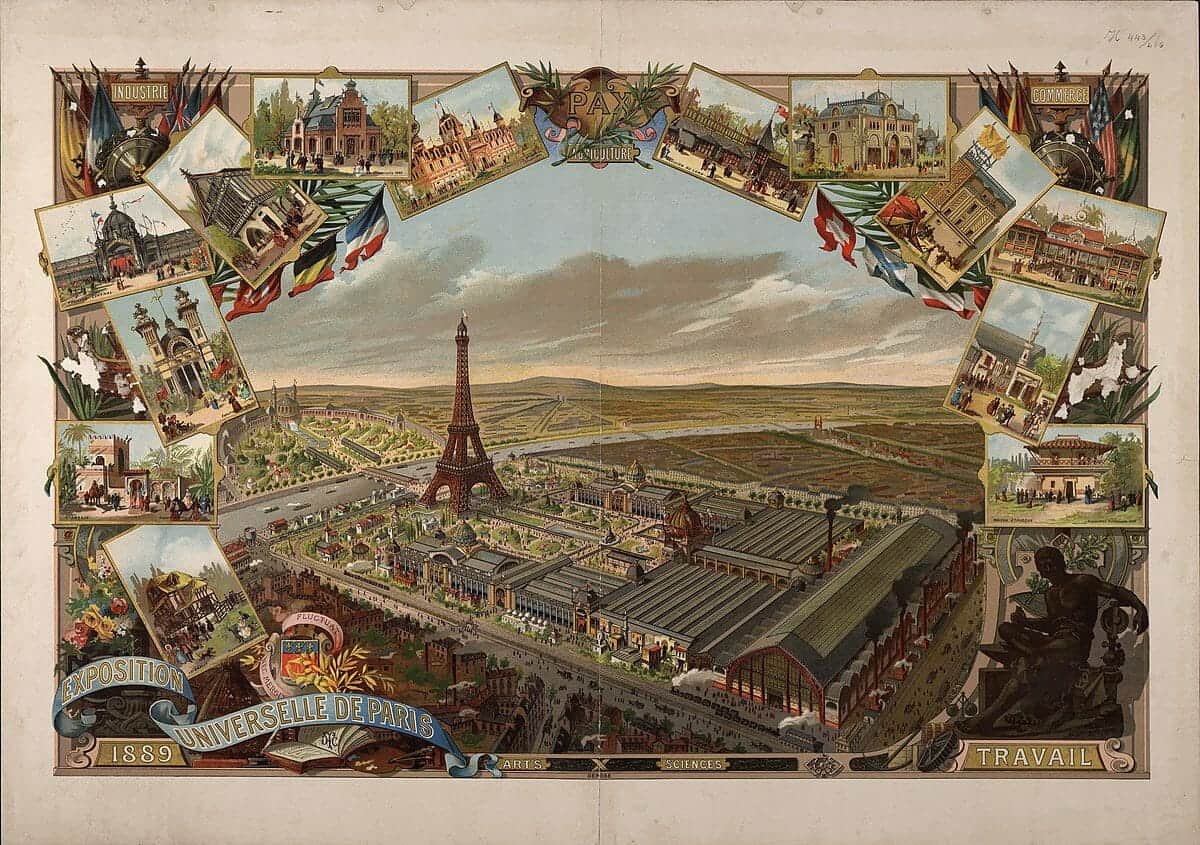|By Lorna Ashton, Field Sales Executive – France|
The International Herald Tribune, founded in Paris in October 1887 as the European Edition of the New York Herald, was a newspaper for American expatriates in Paris, often referred to as “The Paris Herald”. It offered vast coverage of not only Parisian or French culture and events, but of Europe more broadly. Sought out by readers seeking international news throughout Europe and beyond, it became a leading international newspaper worldwide. By 2007, it was published in as many as 33 different countries.
Covering the years 1887 to 2013, The International Herald Tribune Historical Archive traces the history of the twentieth century and evolutions in society, from luxury travel and entertainment to technological developments. Thus I decided that I would use this archive to explore the development of tourism in France and beyond, and how it was linked to innovation and technological progress.
Paris holds a cherished place in my heart, having frequently visited la Seine, its cafés and attractions. I also lived there for a period of time, close to the Eiffel Tower, so it is here I decided to start my journey – with this exquisite metallic beacon, known for many as the symbol of Paris, standing tall as a witness to French history.
The Universal Exhibition of 1889
Monsieur Eiffel’s “Iron Tower of Babel,” with its innovative new iron technology, was built as one of the main attractions at the Universal Exhibition of 1889, which marked the centenary of the French Revolution of 1789. The article below reports that, on May 7, 1889, the President of the Republic, Monsieur Carnot, welcomed France’s many visitors attracted by the six-month long Great Exhibition which celebrated a century of progress in science, labour and commerce. As many as 338,302 visitors paid admission within the first six days!
!["France's Peaceful Progress." New York Herald [European Edition], 7 May 1889, p. [1]. International Herald Tribune Historical Archive, 1887-2013, https://link.gale.com/apps/doc/LQWDHN625019962/IHTO?u=webdemo&sid=bookmark-IHTO&xid=6499dcf6](https://review.gale.com/wp-content/uploads/2021/07/Lorna-Eiffel-Tower-Paris-Peaceful-progress-combined-1024x270.jpg)
Some 61,000 exhibitors presented new artistic and mechanical methods and industrial products. More than half the exhibitors were French, others were from Europe, South America, the United States and French colonies. Not only was this exhibition celebrating international technological progress, the very success of the event was made possible by the development of transport networks such as the “Decanville Railway,” an internal railway which transported visitors between attractions.
!["The Paris Exhibition." New York Herald [European Edition], 26 Apr. 1889, p. [1]. International Herald Tribune Historical Archive, 1887-2013, https://link.gale.com/apps/doc/FWNOGB643247261/IHTO?u=webdemo&sid=bookmark-IHTO&xid=6decb498](https://review.gale.com/wp-content/uploads/2021/07/Lorna-Eiffel-Tower-The-Paris-Exhibition.jpg)

Image available on Wikimedia.
The 1889 “Exposition Universelle” received millions of visitors; approximately 1.9 million came to see and climb the iconic Eiffel Tower. The success of this exhibition paved the way for future exhibitions. Whilst most of the constructions built for the exhibitions were subsequently taken down, the Eiffel Tower remained as a symbol of French prosperity and a growing tourism industry.
French regional tourism grows
Technological advances continued to pave the way for tourism in France, including the advent of the automobile. Searching within The International Herald Tribune Historic Archive for “automobile” and “tourism”, the earliest result appears in March 1900, advertising automobile excursions organised by the newly formed “Tourism Committee/Commission” of the Automobile Club de France:
!["Automobile Excursions." New York Herald [European Edition], 24 Mar. 1900, p. 3. International Herald Tribune Historical Archive, 1887-2013, https://link.gale.com/apps/doc/LCDQYA273635225/IHTO?u=webdemo&sid=bookmark-IHTO&xid=c04def94](https://review.gale.com/wp-content/uploads/2021/07/Lorna-Eiffel-Tower-Automobile-Excursions.jpg)
Automobile tourism flourished with the development of both “les Centres de Tourisme en Automobile” which geographically guided tourists to different regions of France, and the advent of roadmaps – “cartes routières” – described in The International Herald Tribune in 1903. Rural districts became even more “automobilized” in 1905 with the specially constructed “De Dietrich machines” (comfortable and rapid automobile buses) which opened up quick transfers to the Alpine tourist areas of the Vanoise hills, replacing slower horse drawn vehicles.
!["De Dietrich Auto-'Bus Line." New York Herald [European Edition], 5 July 1905. International Herald Tribune Historical Archive, 1887-2013, https://link.gale.com/apps/doc/QXCEYV281655162/IHTO?u=webdemo&sid=bookmark-IHTO&xid=b6b3e18d](https://review.gale.com/wp-content/uploads/2021/07/Lorna-Eiffel-Tower-De-Dietrich-Auto-Bus-Line.jpg)
Investment in tourism
In 1907 the Headquarters of the Touring Club de France was opened in Deauville, to provide members with useful information on tourism. In January 1920, the Minister of Public Works, M. Claveille, laid a proposal before the Chamber of Deputies for a loan of 80 million francs to develop tourism, recognising the economic importance of tourism on the French economy. In the same period, the Syndicat d’Initiative was launched to develop Paris as a tourist centre, and subsequently French regional Syndicat d’Initiative united to make touring easier around France.
![Left: "Paris Taking Steps to Attract More Tourists." New York Herald [European Edition], 13 Jan. 1920. International Herald Tribune Historical Archive, 1887-2013, https://link.gale.com/apps/doc/HUGXIO754706555/IHTO?u=webdemo&sid=bookmark-IHTO&xid=940d0129
Right: "New Tourist Confederation." New York Herald [European Edition], 4 June 1922, p. 6. International Herald Tribune Historical Archive, 1887-2013, https://link.gale.com/apps/doc/OFNMSB718763622/IHTO?u=webdemo&sid=bookmark-IHTO&xid=b086c6f5](https://review.gale.com/wp-content/uploads/2021/07/Lorna-Eiffel-Tower-investment-combined-1024x574.jpg)
Right: “New Tourist Confederation.” New York Herald [European Edition], 4 June 1922, p. 6. International Herald Tribune Historical Archive, 1887-2013, https://link.gale.com/apps/doc/OFNMSB718763622/IHTO?u=webdemo&sid=bookmark-IHTO&xid=b086c6f5
Transatlantic tourism
The transatlantic shipping advancements of the early 1920s were essential at opening up France and the rest of Europe as an international destination to welcome American tourists, as illustrated by the following adverts:
!["Multiple Classified Advertisements." New York Herald [European Edition], 2 June 1920, p. 3. International Herald Tribune Historical Archive, 1887-2013, https://link.gale.com/apps/doc/DKKEQY221036435/IHTO?u=webdemo&sid=bookmark-IHTO&xid=9c5480f4](https://review.gale.com/wp-content/uploads/2021/07/Lorna-Eiffel-Tower-multiple-classified-ads-combined-1024x525.jpg)
This growth in international tourism in Europe supported an increase in the diversity in trips, activities and types of tourism on offer. As seen in the advertisements below, visitors were offered: gastronomy tourism, sampling the culinary delights of the French provinces; visiting Mont St Michel, to follow in the footsteps of “Duc Guillaume le Conquérant”; the Chateaux of the Loire Valley; the Roman Ruins of Provence; the Megaliths of Brittany; attending the 1926 automobile race sponsored by the Tour de France; or visiting the healing resorts of the Vittel water spas.
![Left : "Pour Le Tourisme Des Gastronomes." New York Herald [European Edition], 1 Aug. 1920. International Herald Tribune Historical Archive, 1887-2013, https://link.gale.com/apps/doc/BGRNMJ007775152/IHTO?u=webdemo&sid=bookmark-IHTO&xid=fa077456
Right: "Mont St. Michel." New York Herald [European Edition], 19 Sept. 1889, p. 2. International Herald Tribune Historical Archive, 1887-2013, https://link.gale.com/apps/doc/WHDJEW234389253/IHTO?u=webdemo&sid=bookmark-IHTO&xid=b76d6af2](https://review.gale.com/wp-content/uploads/2021/07/Lorna-Eiffel-Tower-tourism-options-combined-1024x727.jpg)
Right: “Mont St. Michel.” New York Herald [European Edition], 19 Sept. 1889, p. 2. International Herald Tribune Historical Archive, 1887-2013, https://link.gale.com/apps/doc/WHDJEW234389253/IHTO?u=webdemo&sid=bookmark-IHTO&xid=b76d6af2
!["Multiple Classified Advertisements." New York Herald [European Edition], 10 June 1900, p. 2. International Herald Tribune Historical Archive, 1887-2013, https://link.gale.com/apps/doc/JQNRZC182720447/IHTO?u=webdemo&sid=bookmark-IHTO&xid=a6ac3b1b](https://review.gale.com/wp-content/uploads/2021/07/Lorna-Eiffel-Tower-Vittel.jpg)
Organisation and investment in the industry
The 1925 International Conference on Tourism paved the way for the creation of a Central Council for International Tourism, with 23 governments represented, including Austria, Bulgaria, Spain, France, Great Britain, Holland, Norway, Italy, Japan, Switzerland, Monaco, and the United States.
Over the course of the twentieth century, tourism continued to grow, not only in France but across Europe, supported by investments in technological developments. In 1946, France planned a vast expansion of the country’s nationalised airline, Air France, with a total of 5 billion French francs spent on American equipment, new routes and air fields, to build a worldwide flying system capable of competing with the commercial carriers of other nations.
Tourism in Italy
Other European countries also relied heavily on tourism. Italy, for example, has relied heavily on tourism since it became an industrialised state early in the twentieth century, thanks to technological and industrial developments. In fact, Italy was heralded as the capital of tourism in 1968:
!["Italy's Tourist Magic Strong Despite Disasters." Special Section. International Herald Tribune [European Edition], 19 July 1968, p. 13. International Herald Tribune Historical Archive, 1887-2013, https://link.gale.com/apps/doc/BFRVUZ589183720/IHTO?u=webdemo&sid=bookmark-IHTO&xid=9f6da1d1](https://review.gale.com/wp-content/uploads/2021/07/Lorna-Eiffel-Tower-Italys-Tourist-Magic-Strong-despite-Disasters.jpg)
The impact of industrial developments and transport networks on tourism can be seen with the island of Sardinia. The island’s many industrial developments, such as the mines of Sulcis, processing of the mineral aluminium and industrial projects such as the Flumendosa Dam, saw the improvement of ferry and air connections which could be used for tourism as well as industry, and thus in turn created an incentive to further invest in the tourism industry.
Modern day reflections
Right up to the last year of The International Herald Tribune Historical Archive in 2013, the newspaper reflects upon the growing number of tourists across Europe over the course of the twentieth century, described as “a Ray of Sunshine” for Southern Mediterranean countries who, hit hard by the Euro debt crisis, were reaping the benefits of tourism.
The economic might of tourism
I now want to return to my starting point – the Eiffel Tower, its beacon of light continuing to illuminate Paris for its visitors today – as I want to reflect upon Mr. Sisley Huddleson’s broadcast (below) from the Eiffel Tower radio station in 1927. Discussing the post-war economic situation in France and Europe, Huddleson stated that the most important post-war phenomena in Europe is tourism. He noted that it has been a considerable factor in the trade balance, and meant that France stood in a better economic position than it ever had before.
!["French Future Bright, Huddleston Broadcast." New York Herald [European Edition], 8 Apr. 1927, p. 3. International Herald Tribune Historical Archive, 1887-2013, https://link.gale.com/apps/doc/GYFZZK618155215/IHTO?u=webdemo&sid=bookmark-IHTO&xid=a936b20f](https://review.gale.com/wp-content/uploads/2021/07/Lorna-Eiffel-Tower-French-Future-Bright-Huddleston-Broadcast.jpg)
It has been fascinating to explore how technological and industrial developments of the nineteenth and twentieth century helped to strengthen this industry from the perspective of the International Herald Tribune Historical Archive 1887-2013. It would undoubtedly be interesting to delve further into this topic using the perspectives found in other newspapers within Gale Primary Sources!
If you enjoyed reading about historical tourism, you may like:
- Holidaying in the 19th Century? Here’s what you need to know
- Paradise Found: Exploring Historical Maps and Travel Writing
- A Virtual Tour of Marseille using Gale Primary Sources
- Dr Wu Lien Teh as a Travelogue Writer
If you enjoyed reading about the Paris International Exhibition of 1889, you may like:
Blog post cover image: Exposition Universelle de Paris 1889, available on Wikimedia Commons.

